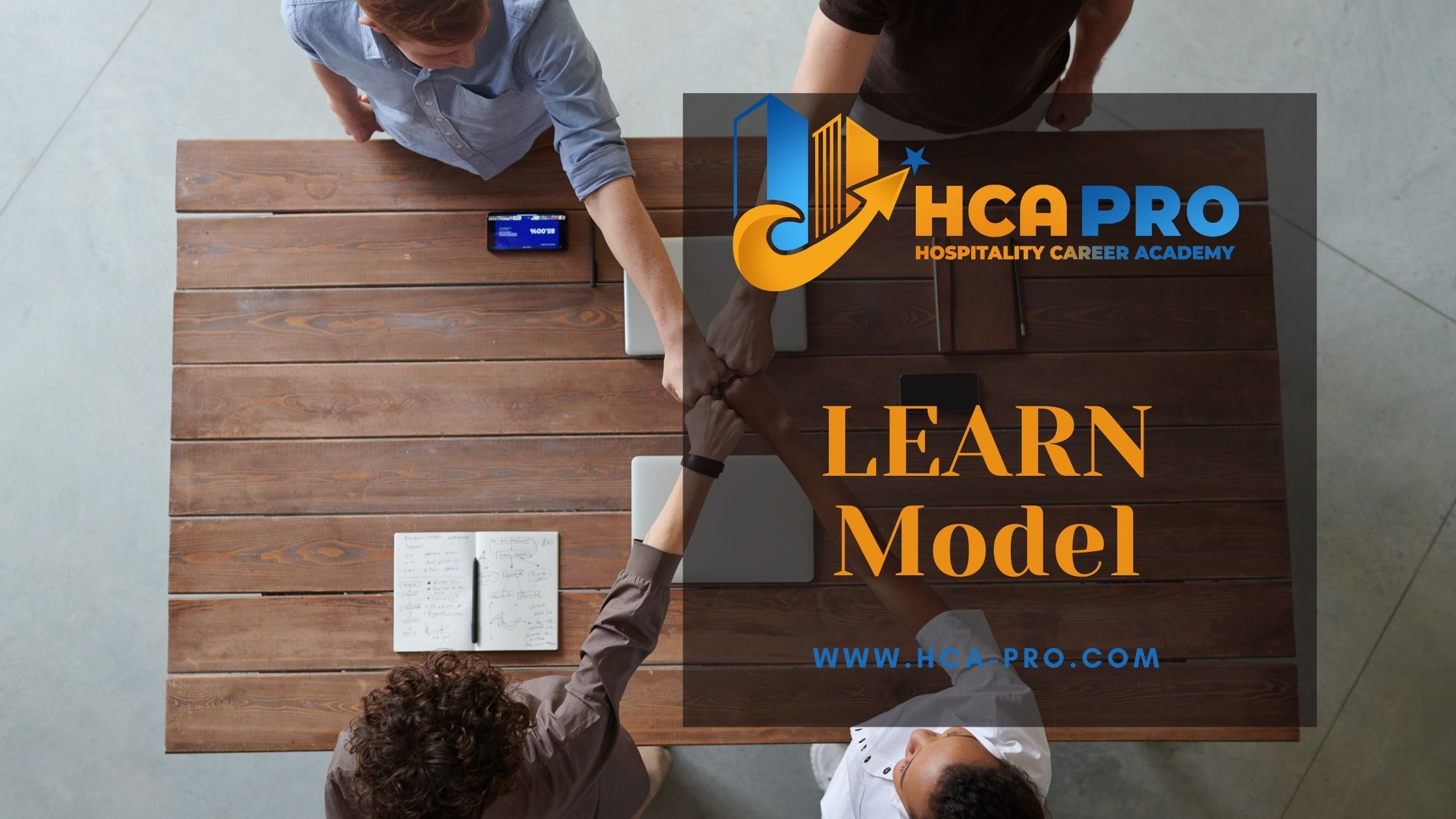
Learn Model is the process to switch angry guest to satisfied guest by following (Listen - Empathize - Apologize - Respond - Notify).
Why LEARN Model?!
- To eliminate recurring problems.
- To create an atmosphere of valuing guest feedback.
- To delight guests who experience problems, with a prompt and appropriate response.
- To provide timely and accurate data on customer issues.
- To impact the guest perception that no one really cares, and change it!
Listen:
Listen to the guest’s concern (eye contact-nodding-positive body language-clarifying questions-undivided attention-not interrupting), Guests appear to be difficult to satisfy at all times, but the first thing you must do is listen to them. Find out what the real issue is and work around it.
Some helpful techniques to improve your listening skills:
-
Maintain eye contact
-
Lean towards the guest
-
Nod your head in agreement
-
Ask questions of understanding
-
Take notes
-
If guest is sitting, lean down or sit, as appropriate
-
Keep a positive tone of voice and body language
-
Use their name, if known
-
Listen intently; don’t disagree, defend or interrupt
Are There Situations Where You Should Interrupt a Guest?
-
YES! Sometimes it is necessary to take control of the conversation.
-
Don’t ask the guest if you can interrupt. Instead, say “please excuse me for interrupting” and then do it!
Empathize:
Empathize to show that you understand the problem (put yourself in the guest's shoes), Attempt to recognize the difficulties that your guest has met. It carries a lot of weight if you give them the impression that the problem was caused by a mistake and that you would do all it takes to fix it.
What is the difference between empathy and sympathy?
Empathy: Identification with and understanding of another's feelings or situation.
Sympathy: Pity or sorrow for distress of another.
Apologize:
Apologize for the inconvenience (remain calm-take responsibility-say you’re sorry-reassure the guest-Don’t take it personally), When an issue comes up, an apology goes a long way. The only thing a visitor wants to hear is that you're sorry for the problem in the first place. According to other critics and reviewers, this is the case 9 out of 10 times. Make it clear that you accept responsibility for what happened and that you will do whatever it takes to rectify the situation.
When apologizing to the guest ensure that you are:
- Sincere
- Straightforward
- Professional
Apology Statements
- Ineffective:
“I am sorry. You must feel awful”.
“Sorry”.
“I feel bad for you”.
- Effective
“I am very sorry that you’ve been inconvenienced”.
“I apologize that this has happened”.
React / Respond:
Respond with an appropriate solution and try to recover guest satisfaction (offer alternatives-Don’t pass the guest off to someone else-Stay focused on the positive).
Make a decision on how you'll deal with the issue. All hotel staff should be able to make the best decisions possible on the spot. A visitor does not want to hear you consult a supervisor or manager about a problem that you can resolve. During this stage of the process, keep the consumer updated. Tell them what measures you're going to take to resolve the problem.
Why our reaction is so important?
-
It can help guest anger to subside.
-
It provides for “Single Contact Resolution”.
-
We can give appropriate compensation.
-
Our sense of ownership and empowerment grows.
-
It gives us an opportunity to increase guest loyalty to the hotel and Marriott.
How to react to a guest's complaint?
-
Take ownership – never say NO!
-
We are all responsible.
-
Never ask a guest to call another department. Do it for them.
-
Do not rest until you are sure that the guest is satisfied.
-
Go the extra mile (or kilometer!).
-
Look for creative ways to say YES.
Now / Notify:
Take action right away. Don't put off your response since every minute you wait to respond feels ten times longer to your visitor. Giving exceptional customer service boils down to quickly resolving issues. Take ownership of a problem to demonstrate that you want to make a difference for that visitor.
Others to notify, as applicable:
- Supervisor/Manager
- Duty Engineer
- Guest Relations
- Department Head
- General Manager
- Other hotels
Read more : The GUEST Model & The GREAT Model In Hospitality
